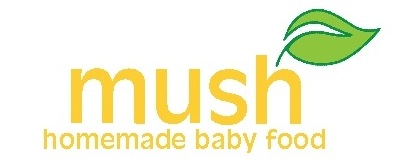We have all heard about Stage 1, 2, and 3 baby food...but what does that mean really? It seems like when you go to the grocery store all the baby food brands label each stage of food differently. Some don't even use stages, they just have pictures of a baby in various positions (sitting, crawling, walking, etc...) When you are making your own baby food it is good to know what these stages are, so that you can replicate the texture and consistency, especially when you are just introducing a new stage to your baby. Here is a brief description of each stage and an example of each.
Stage 1 (4-6 months): The current recommendation from the AAP is to introduce solids starting at 6 months, but many parents choose to starts solids as early as 4 months. This stage of food consists of cooked single ingredient grains, fruits, and veggies which are pureed to a thin, smooth consistency. You want to select foods that are the least allergenic and easiest on baby's tummy. Some examples include: Rice Cereal, Beans Carrots, Peas, Sweet Potato, Squash, Apples, Bananas, Avocados, Pears, and Plums. Always observe the 4 day wait rule when introducing a new food at this stage.
Stage 1 (6-8 months): At this age the consistency should be as described above, however you may combine ingredients that you have already introduced individually. Some examples include: Avocado Banana Puree, Sweet Potato Carrot Puree, Apple Pear Sauce, Apricot Mango Puree. Always observe the 4 day wait rule when introducing a new food at this stage.
Stage 2 (8-10 months): This stage of food consists of cooked multi-ingredient food consisting of grains, dairy, meats, fruits and veggies. The food is mashed or blended but the texture is generally thicker and chunkier then stage 1. At this point spices may be introduced. The ingredients selected should still hold the least allergenic risk. Continue to observe the 4 day wait rule with any new ingredients. Some examples include: yogurt, cottage cheese, boiled or slow cooked and pureed chicken/beef, poached and pureed salmon, beets, spinach, blueberries, and melon.
Stage 3 (8-12 months): "Finger Foods" should be soft and easy to mash with baby's gums. Babies do not need teeth to be able to eat finger foods. Try steaming veggies or baking fruit to make it soft enough for baby to eat as a finger food. Slow cooking meats make them extra tender and easy for little ones to "chew." Break or cut into small pieces. Ripe pears, banana, or avocado may make a perfect first finger food.



1 comment:
great info !
thank u ......
Post a Comment